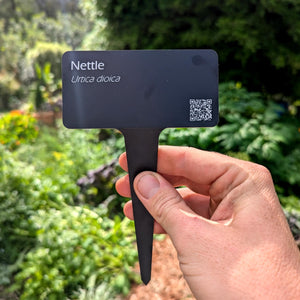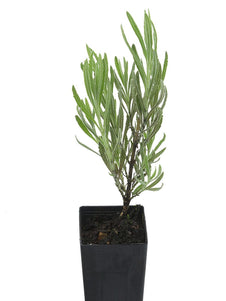
Lavender - Heterophylla Lavender
Lavender - Heterophylla Lavender

- In stock, ready to ship
- Inventory on the way

Usually available: All year
Life cycle: Perennial
Height: 90cm - 1.2m
Position: Full sun
Soil preference: Well drained
This is how we pack and send your Herb Plants to all states except TAS & WA
You will receive
- 1 Heterophylla Lavender Herb Plant in a 50 X 75mm tube - General growing instructions
All of our Herb Plants are grown organically with certified organic potting mixes and fertilizers
Botanical Name: Lavandula heterophylla
Lavandula X heterophylla is one of the largest hybrid lavenders and is known to be vigorous and/or fast growing. The final height of the plant may be 90-120cm when in full bloom. The narrow leaves are dark to medium green with entire margins, except at the base where they are finely toothed. The foliage on this lavender often seems brighter than others, possibly due to the contrast between the dark violet-blue flowers and the green leaves. The calyces are also green and set off the deep violet colour of the flowers which are arranged in whorls up the stem. The flowers are held on long stems of up to 30 -40 cm, which stretch high above the foliage.
This lavender is a reliable bloomer with the main show being in mid spring, followed by an autumn repeat. However, in some warmer areas it may flower all year round. The fragrance is of lemon and lavender with pine undertones, which is quite different to most French Lavenders. As with most lavender species, L. heterophylla is a good honey plant and attracts bees and butterflies.
Lavender plants tend to hybridize quite easily and Lavandula X heterophylla is thought to be a cross between L. dentata and L. angustifolia, first found growing wild in Southern France in the 1880s. Interestingly, this lavender is also called Sweet Lavender, but the taste is actually quite harsh, heavy and generally unsuitable for consumption. Lavender heterophylla is also known as a Pterostachys Lavender, which refers to the way the flowers are borne at the top of the stems looking like ‘winged spikes’. These lavenders do not have as strong a fragrance as the English lavenders. Lavender caneriensis, which is also in our catalogue, is also a Pterostachys Lavender.
There is occasional confusion between L. heterophylla and L. allardi, with the latter being labelled L. heterophylla. To tell the difference, check the foliage colour to see if it is tending towards grey. More grey is L. allardi, which is a larger plant and has larger leaves than L. heterophylla.
Lavender is a much loved garden plant with a long history and many modern cultivars. The Lavandula genus belongs to the Laminaceae family, which is also known as the mint family. It has over 3500 species, from more than 180 genera, distributed across the globe. Most of this family of plants come from the Mediterranean and regions with similar climates. They are well suited to growing in the wide range of Australian conditions.
Each variety is distinctive and may have different properties. For further information please check our other lavender plant listings.
Growing Conditions
Lavendula X heterophylla requires full sun to part shade to grow well. Most soil types will be acceptable, except heavy or damp clay soils. Light, sandy, well-drained soil is ideal. This lavender is tolerant of coastal and maritime conditions. It is also drought tolerant, very tough and well suited to Australian conditions.
If the plant becomes woody in the centre, cut out those branches and allow new spring growth to fill in the centre. Once this has occurred any further woody branched may be trimmed. Propagation should be via cuttings in order to maintain the purity of the plant.
To manage airflow in areas of high heat and humidity leave wide spaces between plants and limit water supply to avoid root rot. Pea gravel is a good mulch for lavender plants since it will not soak up moisture or collect around the roots and base of the plant like soft mulches. It also allows water to drain freely.
Medicinal Uses
Many lavender species do have a history of traditional medicine use. Hybrid plants may not be as pure in the essential oils as the native species, but further information may be found in our other lavender listings.
Culinary Uses
Despite being called ‘Sweet Lavender,’ the flowers of L. heterophylla are not recommended for human consumption due to the ‘pine-like’ undertones in the flavor and aroma. However, some other lavender varieties are suitable for deserts, honey or flavouring baked products.
Other Uses
The buds of L. heterophylla can tend to drop off the stalks if picked fresh, so they do not always do well as cut flowers or dry as well as other varieties. Despite this, it is always worth trying the blooms to see how your particular plant fares. They do make nice lavender wands, as they have long flexible stems.
All information provided on this website is for informational purposes only. Please seek professional advice before commencing any treatment.




